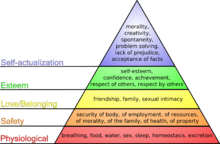Motivation and emotion/Book/2022/Physical and psychological needs
Note: This is an incomplete, abandoned chapter which has been relisted for further development. The new author is free to use, change, or remove any existing content. This notice can be removed. |
What is the relationship between physical and psychological needs?
Overview
[edit | edit source]- Introductory sentence about motivation and emotion (Unique sentence aiming to engage the reader).
- Brief overview of physical needs - including examples and importance
- Brief overview of psychological needs - including examples and importance
- Illustrating the problemː Is there a relationship between physical and psychological human needs? Do they influence one another? Is there sufficient psychological science to conducted on the topic? Is there any limitations to understanding the relationship between physical and psychological needs.
- Case study question to be examinedː Are there any physical and psychological differences between men and women?
|
Focus Questions:
|
What are physical needs?
[edit | edit source]- Introductory sentence to physical needs.
- Main source (Johnstone, 2010).
Definition of physical needs
[edit | edit source]
Examples
[edit | edit source]
Importance of physical needs
[edit | edit source]
What are psychological needs?
[edit | edit source]- Introductory sentence to psychological needs.
- Main source (Martela & Ryan, 2015).
Definition of psychological needs
[edit | edit source]
Examples
[edit | edit source]
Importance of psychological needs
[edit | edit source]
What is the relationship between physical and psychological needs?
[edit | edit source]- Introduction sentence to the relationship between physical and psychological needs.
Define relationship
[edit | edit source]
Relationship between physical and psychological needs
[edit | edit source]
Limitations in research
[edit | edit source]
Theoretical basis of human needs
[edit | edit source]
Maslow's hierarchy of needs
[edit | edit source]
Murray's system of needs
[edit | edit source]
Self-Determination Theory
[edit | edit source](Van den Broeck, Ferris, Chang & Rosen, 2016)
McClelland’s Acquired- Needs Theory
[edit | edit source]
Alderfer’s ERG theory
[edit | edit source]
Case Study
[edit | edit source]
|
Working notes
[edit | edit source]- Questions to ask - how to edit the quiz boxes to suit your question?
Tables
[edit | edit source]Tables can be an effective way to organise and summarise information. Tables should be captioned (using APA style) to explain their relevance to the text. Plus each table should be referred to at least once in the main text (e.g., see Table 1 and Table 2).
Here are some example 3 x 3 tables which could be adapted:
Table 1.
Example of a Table with an APA Style Caption
| Children | Gather | Round |
|---|---|---|
| Mary | had | a |
| little | lamb | it's |
| fleece | was | white |
Table 2.
Another Example of a Table with an APA Style Caption
| Nursery | Rhyme | Time |
|---|---|---|
| Incy | Wincy | spider |
| climbed | up | the |
| water | spout | down |
Table 3.
Example of a Sortable Table with an APA Style Caption
| Fruit | Price/kg | Popularity |
|---|---|---|
| Tomatoes | $6.00 | 1st |
| Bananas | $5.00 | 2nd |
| Watermelon | $2.99 | 3rd |
| Oranges | $3.85 | 4th |
| Apples | $4.95 | 5th |
| Grapes | $9.50 | 6th |
| Mangoes | $12.00 | 7th |
| Avocados | $12.00 | 8th |
Quizzes
[edit | edit source]Quizzes are a direct way to engage readers. But don't make quizzes too hard or long. It is better to have one or two review questions per major section than a long quiz at the end. Try to quiz conceptual understanding, rather than trivia.
Here are some simple quiz questions which could be adapted. Choose the correct answers and click "Submit":
To learn about different types of quiz questions, see Quiz.
Conclusion
[edit | edit source]The Conclusion is arguably the most important section. It should be possible for someone to read only the Overview and the Conclusion and still get a good idea of the topic.
|
|
See also
[edit | edit source]Human Needs (Book chapter, 2013)
Murray's System of Needs (Wikipedia)
References
[edit | edit source]Martela, F., & Ryan, R. (2015). The Benefits of Benevolence: Basic Psychological Needs, Beneficence, and the Enhancement of Well-Being. Journal Of Personality, 84(6), 750-764. doi: 10.1111/jopy.12215
Van den Broeck, A., Ferris, D., Chang, C., & Rosen, C. (2016). A Review of Self-Determination Theory’s Basic Psychological Needs at Work. Journal Of Management, 42(5), 1195-1229. doi: 10.1177/0149206316632058
External links
[edit | edit source]Maslow's hierarchy of needs (McLeod, 2020)
Physical and Psychological Needs of Humans (Tahira, 2014)
